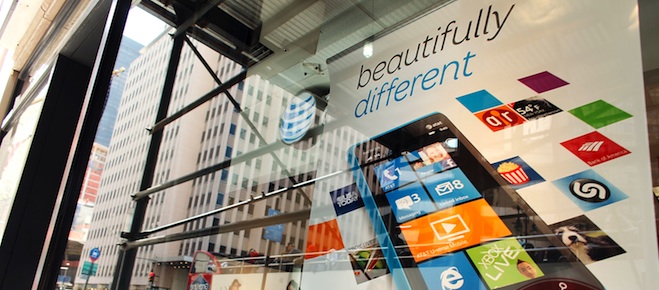Why the new Windows Phone 8 is Nokia’s biggest gamble
Microsoft can survive a flop. Nokia can’t.
< > on April 9, 2012 in New York City.
Share

As numerous analysts have pointed out, this week could make or break Nokia as it shows off its new Windows Phone 8 devices at a press event in New York. “Make” is actually a strong word – “stave off death” is probably more appropriate.
The storied Finnish cellphone maker, in partnership with Microsoft, is benefiting from some good timing in light of the big setback handed to Samsung by a court two weeks ago. With the court siding with Apple in that epic patent dispute, Samsung and other phone manufacturers using Google’s Android operating system are likely to be slowed down in the near term, at least in the all-important U.S. market.
That gives Nokia, which essentially put all of its eggs into Microsoft’s basket last year, a window of opportunity. Wireless carriers are now especially inclined to push Windows phones, to prevent Apple and perhaps even Android from gaining too much power over them.
So far though, Nokia and Microsoft have failed to spark the imaginations of the buying public. Windows phones, despite promising a very different experience from iPhone and Android devices, have captured less than 4 per cent of the global market, according to Strategy Analytics. That’s compared to 17 and 68 per cent respectively for Apple and Google. (BlackBerry, by the way, has plummeted to just 6 per cent, according to IDC.)
If whatever Nokia unveils this week – two phones are expected – isn’t a big hit, it may be hard for the company to continue on in its current form. Some analysts think the company might have to be sold or carved up for its parts. The most logical buyer would of course be Microsoft, if only for Nokia’s patents – which, as has become very apparent recently, are incredibly important.
Could Nokia also adopt that old adage of “if you can’t beat ‘em, join ‘em,” and ditch Windows for Android? Not likely. The company has already spent several years switching over from its own operating systems to Windows, suffering big losses along the way. Switching again would take time and more losses, which the company simply can’t afford.
What about Microsoft? Some observers believe this week is also the company’s last chance to get into the game, but it’s probably not that simple. Microsoft has cash to burn and thus the time to experiment. A good example of the company’s patience is the video game console world. Twelve years ago, people thought the company was nuts by getting into a market ruled by Sony and Nintendo. Now, many, many losses later, Microsoft is the global leader in consoles with the Xbox division delivering nice profits. Slow and steady does indeed sometimes win the race.
So what about RIM? As I wrote after the Apple-Samsung verdict, the BlackBerry maker is likely to miss out on the window of opportunity presented by the court, with new devices not expected till some time next year.
In the larger sense, one only has to look at the size of the companies involved in this battle for the mobile marketplace to see which way it’s likely to go. In phones, size is everything – the bigger the manufacturer, the cheaper they can build phones and the more of them they can sell. Looking at the market capitalization of the key players (as of this past Friday), it’s pretty clear the odds are heavily stacked against pure-play phone makers Nokia and RIM:
- Apple: $623 billion
- Microsoft: $259 billion
- Google: $224 billion
- Samsung: $161 billion
- Nokia: $10 billion
- Research In Motion: $3.4 billion
Regardless of what happens in the long run, I’ll be covering Nokia’s event in New York. Be sure to follow me on Twitter for live reports.